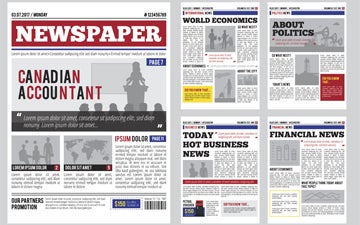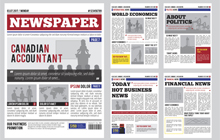Sunday News Roundup 25.04.27: Election tax talk, CRA mishaps, PCAOB gutting, and more Canadian accounting news

Our weekly Canadian accounting news roundup includes tax commentary during the federal election campaign, the end of the PCAOB, mishaps at the CRA and more
Subscribe to our weekly newsletter and get all the week’s stories. Click here to sign up.
TORONTO, April 27, 2025 – With Election Day tomorrow and the polls tightening between the Conservatives and Liberals, now is the time to look back upon the campaign coverage for a few common themes of interest to Canadian accountants. It almost goes without saying that this is an election about trade — specifically our economic relationship with a United States led by President Donald Trump — and trade has overshadowed taxation, the national debt and deficit, and more general economic topics such as productivity and innovation.
But accountants have tried to change the conversation. Allan Lanthier wrote a series of columns for both the Globe and Mail and the Financial Post on a variety of topics, including Pierre Poilievre’s fully costed platform, the petty policy bribery of the political parties (also railed against by author John Rapley in the Globe), and the transfer pricing practices at Brookfield Asset Management.
Perhaps corporate tax avoidance is just a tempest in a teapot, as Allan Lanthier writes, when there are more pressing tax questions in Canada. But Pierre Poilievre stunned some traditional supporters when he said Conservatives would close offshore tax loopholes, because it was time for “Canada’s wealthy elite to pay their fair share.” One might forgive Poilievre for moving leftward, just as Mark Carney moved to the right, in order to broaden their appeal, but Linda McQuaig in the Toronto Star wasn't buying it, saying that the Carney and Poilievre policy differences are huge.
For McQuaig, Poilievre is an “an anti-government extremist whose views are rooted in the radical libertarian economic vision.” That might appeal to some accountants. Accountant Kim Moody, who hosted Poilievre (back when he was still wearing business suits and spectacles) on his podcast back in April of 2021, wrote in the Financial Post that Carney's 'spend less, invest more' marketing catchphrase means more taxes are coming.
The end of the PCAOB … and more
We were the first Canadian media outlet to warn that the Trump Administration would eliminate the Public Company Accounting Oversight Board in its war against regulation. According to the Financial Times, the wheels are now turning, as the Republicans published a proposal late on Friday for the PCAOB to be folded into the Securities and Exchange Commission.
The move would effectively gut the audit watchdog — an outcome that even the audit industry’s lobby group, the Center for Audit Quality, thinks is a bad idea. While some Canadian firms, especially those targeted by the watchdog, might cheer the disappearance of the PCAOB, most serious professionals recognize the dangers of an unregulated profession, and the positive influence that the PCAOB has had on our own audit regulator, the Canadian Public Accountability Board.
The news was barely reported in Canada and the United States — which is typical of news released late on Fridays — but Bob Rae of all people posted his reaction on Twitter/X. “This is how centralized authoritarianism works,” posted Rae. “Fire the auditors, arrest the judges, intimidate the universities, silence the lawyers. It is a universal, historic pattern. We cannot turn away from this.”
We also recommend The New Yorker’s recently published The Plight of the Taxman, which profiled “Mike,” an employee of the Internal Revenue Service. It’s a profile piece that provides human interest behind the news, published by the International Consortium of Investigative Journalists, that the IRS unit that audits billionaires and other ultrawealthy individuals has lost 38% of its employees this year amid the Trump administration’s slashing of the federal workforce.
In the New Yorker, “Mike” talks candidly about life at the Internal Revenue Service, where “employees toil through tax season, [as] their agency is being dismantled by the government it powers.” Mike has been an a customer-service representative at the IRS for more than 20 years. He believes that the Trump Administration will not only succeed in dismantling the I.R.S. but will damage America’s long-term ability to raise revenue.
Mike makes a distinction between billionaires and wealthy people to illustrate an interesting point. “If a heart surgeon makes five million bucks a year, he might pay a million and a half or two of it in federal taxes; or an officer in a large construction company who’s making three hundred or four hundred thousand a year and paying fifty or sixty thousand dollars in taxes. These are the folks really floating the boat, because they can’t hide their income.”
Meanwhile, a reader shared this commentary on DOGE, and its apparent sabotage of the tax division of the Department of Justice. As the Trump Administration continues to dismantle the regulatory regime that enforces the tax system, we will continue to watch and report with both dread and fascination — like passing a car crash on the 401 — the news south of the border.
More mishaps at the Canada Revenue Agency
This tax season has been a pretty typical one for the CRA — embarrassing. There’s the tax “slip-up” that is still ongoing from a software update introduced in January. There’s the ongoing hacking of taxpayer information through third-party tax preparation software companies such as this one that occurred in BC. And there’s a discrimination lawsuit allowed to proceed in Federal Court against the CRA by an employee who alleged the CRA was racially profiling applicants.
Finally, nine years after the Panama Papers investigation by the International Consortium of Investigative Journalists, the CRA still can’t say (or won’t say) what it’s collected in tax arrears from the leaks, because it tracks only assessments, not collections. Nor has it filed any criminal charges against tax evaders.
Other nations (all in Europe) have collected billions in back taxes. The CRA will only say that it has assessed but not necessarily recouped $124M, which one professor calls “pathetic.” Perhaps the only other nation more pathetic is the United States, where the IRS has simply refused to share any information at all.
Is AI changing the role of the Canadian staff auditor?
A new academic study was recently published in the journal Accounting Horizons that says Automation isn’t replacing auditors, it’s rewriting the job description. To read the article published by the University of Waterloo, the end result is postive, but buried within the study are some interesting opinions about the state of audit practice at Canadian accounting firms.
Yes, artificial intelligence is changing the role of the staff auditor — typically the youngest and least experienced accountants — taking away some of the mundane tasks and allowing them to focus more on client advisory. That means that the SA is becoming the face of the firm to most clients, placing more emphasis on soft skills, and some senior auditors worry that the typical SA is losing out on some important technical experience.
Also, “that firms were generally unable to find sufficient new hires that possess both the requisite technological and accounting skills despite the fact that accounting training programs have started to incorporate more technological education.” So they are hiring both junior auditors with no technical training and computer kids with no accounting experience. (It always helps to read the whole study!)
Accounting Dealbook
This past week, homegrown national accounting firm MNP picked up another firm in Quebec, this time Groupe La Somme inc., based in Rivière-du-Loup, serving clients across the Bas-Saint-Laurent region of la belle province. Just last month, the firm acquired Houle and Associates Chartered Professional Accountants, which is based in Ottawa, and specializes in tax and advisory services to healthcare professionals. MNP also recently acquired a couple of consulting agencies in the digital forensics and insurance advisory sectors respectively. Quite a start to 2025!
Quick Hits: Articles of Interest
Canadian
International
Baker Tilly, Moss Adams merge to create 6th-largest US CPA firm (Journal of Accountancy)
PwC shuts operations in nine African countries (Reuters)
By Canadian Accountant staff.









(0) Comments